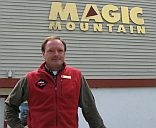
(Host) If you’ve ever dreamed of owning a piece of a southern Vermont ski resort, here’s an interesting opportunity: Londonderry’s Magic Mountain resort will soon be selling shares.
If the sale is successful Magic would become Vermont’s second cooperatively owned ski mountain, after Mad River Glen.
VPR’s Susan Keese reports.
(Host) In 1960 Swiss-born skiing pioneer Hans Thorner bought 700 acres on Glebe Mountain in Londonderry and renamed it Magic Mountain.
Thorner built a rustic Alpine Village and established modest prices, and the resort began attracting families. Many of those families have kept coming, even as neighboring resorts like Bromley, Stratton and Okemo more than doubled in size, snowmaking capacity and amenities.
Greg Williams is one of those families. Williams lives in Clinton, Connecticut. His father bought a house near Magic in the 1970s. Now he’s watching his brother’s kids enjoy the mountain he loved as a child. Williams says Magic’s 1600-foot vertical drop makes for some of the best skiing anywhere.
(Williams) This is basically my thirtieth year of skiing Magic well, minus the closed years. It’s very different from anywhere else. There’s no glamour to it, there’s no high speed quads, there’s nothing fancy about it but it’s just got great skiing and great people and it’s just a fun place to be.
(Keese) The ‘closed years’ were a string of seasons in the nineties when the resort went bankrupt under one of Thorner’s successors following a few snowless winters. A group of investors reopened the resort. But limited snow making capacity has remained a problem.
Since 2006 Magic has been leased and run by Jim Sullivan. He’s a former ski racer who left a law practice in Connecticut and moved back with his family to his native Vermont. He hoped to find financial backing to buy Magic. But the big investors haven’t materialized. So he’s turned to another model.
(Sullivan) We are going to issue a formal offering of $3,000 shares and we need to sell three hundred of them within 90 days and the offering is going to come out early to mid June and then by approximately September 1, if we sell 300 that will be adequate to open the next season, and I’m confident that we’ll be able to do so.
(Keese) Ultimately Sullivan says he hopes to sell a thousand shares. The sale will help buy the property, but the owners have agreed to wait, if the sale succeeds, while Magic invests in a couple million dollars worth of snowmaking.
Shareholders will enjoy reduced ticket prices and a say in the resort’s operations rather than financial returns. The coop model was pioneered by Mad River Glen in 1995, and Sullivan says the resort has been extremely helpful in helping him make his plans.
Mad River Glen Marketing director Eric Friedman says he hopes Magic succeeds.
(Freidman) It’s similar to Mad River in that it attracts people who really like to ski. It’s not about real estate, it’s not about spas – but they don’t get the natural snow.
(Keese) Mad River is less reliant on snowmaking. Friedman says Mad River couldn’t make a profit if it had to make as much snow as Magic does. He also questions whether Magic’s pool of supporters is large enough. Mad River budgets for about 85,000 skier visits a year.
Sullivan says Magic’s business model calls for 35 to 40,000 skier visits, double what it’s seeing now. But he believes the passion and the loyalty are there to make it happen.
For VPR News, I’m Susan Keese.